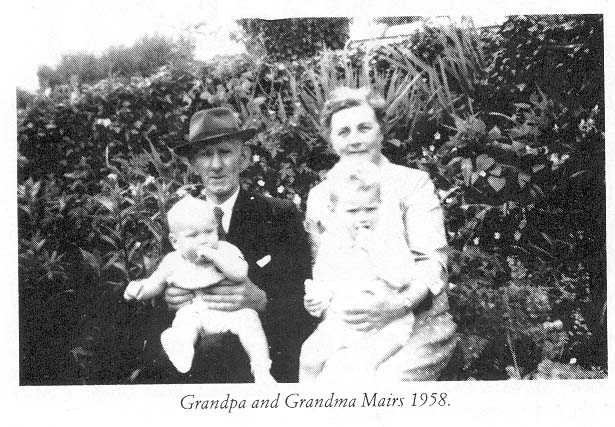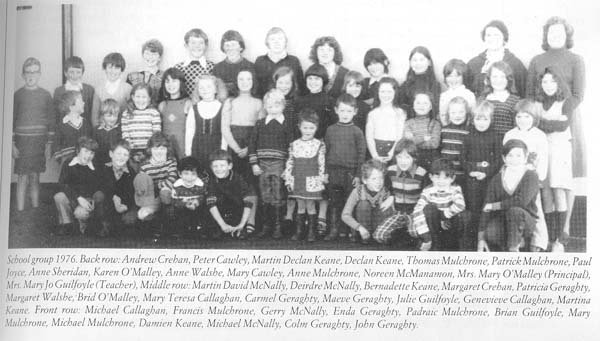
Fifty years ago, we had a terrible world war on our hands. In 1942, buildings were being razed to the ground in complete ruin, death and destruction everywhere; we here in County Mayo had a new school built!
Cuilrnore National School was built in 1942. The noise of battle was not far away, but there was always the fear that it might not remain that way. We heard of the awful things going on in Europe and how nearly every country in the world was affected by warfare. Our casualties were thankfully few, but that too could change overnight.
It took faith and courage to carry on with the daily round, the common task. We also felt the pinch of shortages. If we older folk cast our minds back -those of us who have mind and memory left intact at this stage! -we can recall where the pinches were felt most.
Shortages of things we took for granted in everyday life, this and that, such as sugar in our tea -often no tea to put sugar in! Our daily bread, made from war flour, was not very palatable. There was no rural electrification in those years, and lighting of the home was by candles or paraffin oil, both of which became very scarce. The school-going children had to go to bed early (but not before they had their homework done). The fires had to be built up to get good flames for the man-of-the-house to read the "Mayo News" or the " Western People."
Granny knitted away in the chimney corner - when she could get yarn. She needed little illumination to carry on with her two purl two plain, of the socks or stockings. "Sure they don't last long in those clogs these day," she would say, quite cheerfully. She had seen hard times before ever there was a war! Those clogs replaced the shoes and boots, which were made, for the most part, of compressed browp paper. When they were brought home from the shop, they looked just fine, but one trip across the "short-cut" through Uncle Joe's field of wet aftergrass put paid to the lovely new shiny black boots! The clogs stood up to things for much longer. Their drawback was that they were noisy. A fellow couldn't tip-toe through the tulips wearing his clogs!
Clothes for growing children were a sore trial for mothers. The material in shop-bought skirts and dresses was of poor quality. Knitting-wool was hard to get. Granda had to be satisfied with his old socks cobbled together with lengths of yam ripped from even older worn out ones, to keep his poor old toes warm! It was very difficult to turn boys and girls out to church and school warmly and neatly clad. But mothers managed it -mothers always do!
American gift parcels were a help for the fortunate ones who had sisters, cousins, aunts and uncles in the States. They sent what they could, they did not forget 'the old folks at home.' Opening a "Yankee" parcel was a great treat, though often rather disappointing. That pink, frilly dress that fitted little Mollie or the grand blue coat for Patsy might have looked mighty fine in Chicago, but it looked rather too con- spicuous in Cuilmore. Still it is the thought that counts, isn't it!
While the women struggled to make life go on in the home, feeding and clothing the family as best they could, in spite of shortages, the men had their work "cut out" for them also, what with no artificial manures to grow the crops and cope with Compulsory Tillage. This last men- tioned meant great worry and hardship when farm machinery was almost 'nil' in these parts at that time; no tractors, the odd horse-drawn plough or harrow, no mowing machines and no threshing machines. Then the weather "played up" just when the hay was ready to be cut and saved, or the grain crop ready for reaping, or the potatoes due for digging.

Still there was at least one bright spot -there usually is. Cattle prices went sky high! At the fairs the little bullock or the nice little heifer was worth a whole lot more than they are these days.
Eggs and butter and anything in the food category found eager purchasers at the markets. On the whole, country folk fared better than their friends in towns. "Out in the country, sure ye have everything for nothing!" They said it then and they are still inclined to think that way. (They forget all the hard work and the risks attached to everything).
Most people managed to keep a pig, maybe two, to fatten up for home consumption. Those who could not do so were not forgotten.
Neighbours always shared food and other things with their friends. (They still do!) They also shared work. ..the day the hay had to be "reeked", the grain crop reaped or the potatoes dug, the men and bigger boys turned up, in good time that morning, spades or hay-forks over their shoulders, and worked with a will for the day, and the next day too, if necessary. Of course, they had "great crack" and practical jokes to lighten the load. The younger school children helped too; the roll-call in Cuilmore school showed many absences that day when the "spuds" were dug or the cattle went to the fair!
To suggest building a new school must have sounded rather rash in those days. But just as faith and courage kept people going through all their hardships, it was faith and courage that got them a new school! Families about Cuilmore school know they have been very fortunate in having that school. They supported the work of building it with their labour and their substance. Now they can proudly celebrate their little school's Fiftieth Birthday.
They will reward those teachers, now gone to their Eternal Reward, with affection and gratititude. They will also, thank those teachers who are now carrying on the good work in their neat, well kept school- they too, deserve their laurels. We wish them and their pupils every success and hope they will keep the Old Firm going for another fifty years, at least.
